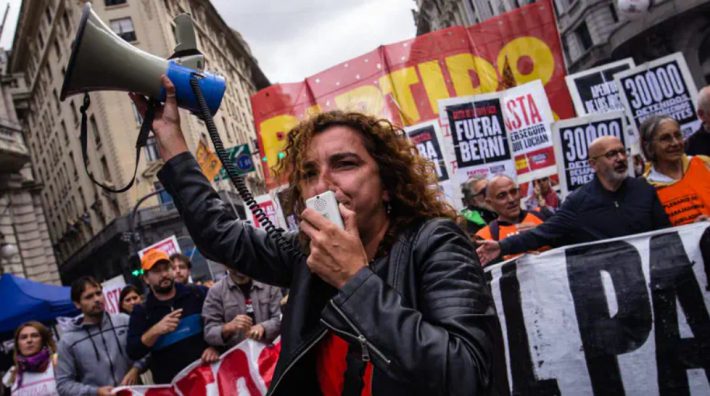The numbers of antisemitic incidents in Europe are staggering, but worse still is the silence, the rationalization, and the institutional inaction. This climate emboldens groups like Hezbollah which is making inroads into Africa. Opinion.
On April 1, three individuals were arrested in the heart of Barcelona’s Eixample district, a picturesque and upscale neighborhood known for its cafés, boutiques, and tree-lined avenues. But this time, the focus was not the architect Gaudí or appetizing tapas. The three men, according to Spanish authorities, were allegedly building explosive drones on behalf of Hezbollah, the Iran-backed terrorist organization. Their workshop was just blocks away from a synagogue and a Jewish school.
This is no longer about distant conflicts or theoretical threats. This is about terrorism operating in plain sight, in the center of a European city. And it is about the dangerous, growing presence of Hezbollah across Europe and North Africa—one that governments have failed to confront with the urgency it demands.
For those who have followed Hezbollah’s activities in Europe, the arrests were shocking, but not surprising. In July 2024, a joint Spanish-German counterterrorism operation dismantled another Hezbollah-linked network believed to have produced over 1,000 drones intended for use in attacks, possibly against Israeli or Jewish civilian targets. That network involved businessmen with European citizenship and operated across multiple countries. This is not a case of isolated actors or fringe ideologues. This is organized, strategic, and embedded.
Hezbollah is not a shadowy movement confined to Lebanon. It is a state-sponsored militant group, designated as a terrorist organization by both the European Union and the United States. It thrives not only on violence but on apathy. And right now, it is exploiting the cracks in Europe’s security, law enforcement and political resolve.
The story unfolding in Barcelona is not just about drone components or clandestine cells. It is about the intersection of terrorism and antisemitism, and how permissiveness in the name of tolerance has created fertile ground for both. What makes this particular case so alarming is not only the proximity of the suspects to Jewish institutions, but the political and social climate in which this kind of threat is becoming increasingly normalized.
Antisemitism in Europe is no longer a historical scar—it is a present, accelerating reality. Since the October 7 Hamas attacks in Israel, antisemitic incidents have surged across Western Europe. In the United Kingdom alone, over 3,500 incidents were recorded, more than 200 of which were violent. In France and Denmark, synagogues and Jewish businesses have been attacked, and Jewish individuals assaulted in broad daylight.
The numbers are staggering. But worse still is the silence, the rationalization, and the institutional inaction.
Many of these antisemitic attacks are cloaked as political protest. But the line between anti-Zionism and antisemitism has not just been blurred—it has been deliberately erased. Demonstrations held outside synagogues instead of embassies are not protests; they are acts of intimidation. Chants like “from the river to the sea,” uttered days after massacres, are not slogans of peace—they are endorsements of ethnic cleansing.
This climate emboldens groups like Hezbollah. The group does not need to fly its flag in European capitals to make its presence felt. It thrives in the ambient tolerance of extremism, in the willingness of institutions to look the other way, and in the political alliances that legitimize its narratives.
In Spain, political parties that are part of the governing coalition have shown alarming sympathy toward radical groups ideologically aligned with Palestinian Arab terrorist organizations. Media outlets funded by Iran operate freely. Hezbollah is not merely tolerated—it is, at times, echoed. As Ángel Mas, president of the advocacy group ACOM, put it, “Spain is no longer a bystander.”
And the problem is not confined to Spain. Across Europe, from Belgium to Germany, from the Netherlands to the UK, Jewish communities are reporting increased threats and shrinking public spaces. Many Jews now think twice before wearing a kippah in public or sending their children to Jewish schools. This is not paranoia. It is prudence born from experience.
Ron Brummer, deputy director general for combating antisemitism at Israel’s Ministry of Diaspora Affairs, has warned that antisemitism today is no longer confined to extremist corners. It is embedded in mainstream discourse—in academia, in NGOs, in public institutions. It is repackaged as human rights activism, as social justice, as political critique. But the outcome is the same: a chilling effect on Jewish life and a permissive environment for those who wish to do harm.
Hezbollah benefits from this environment. It builds alliances, not only logistical but ideological. In North Africa, too, Hezbollah’s reach is growing. Smuggling routes in Libya, ideological inroads in Tunisia and Algeria, and indirect influence through Iran-backed entities have all contributed to a regional web of activity that increasingly points northward. The Mediterranean is no longer a barrier—it is a highway.
The failure to recognize Hezbollah as an internal European threat is not just a strategic miscalculation. It is a moral one. When terrorist operatives are discovered building weapons just blocks away from synagogues, and two of the suspects are released on minimal restrictions, it signals to all the wrong actors that Europe is not prepared.
Former Spanish lawmaker Pilar Rahola called the arrests a wake-up call “that nobody heard.” She observed, correctly, that had the suspects belonged to Spain’s former domestic terrorist group ETA, the judicial response would have been far more severe. But Hezbollah is viewed as someone else’s problem. Lebanon’s problem. Israel’s problem.
It is time to accept that Hezbollah is Europe’s problem. And if North African governments, too, fail to recognize the extent of this infiltration, it will soon become their problem as well. The arrests in Barcelona were not an isolated alarm—they were a warning of what is already here, and of what may come next.





